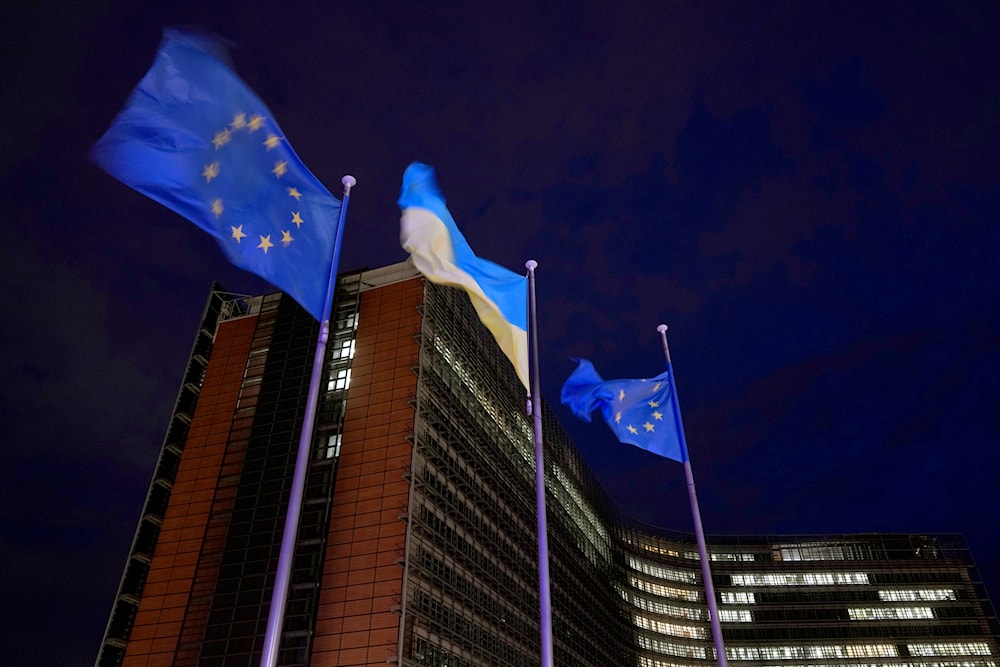European Union to take 4 Russian nationals off sanctions list
The EU's decision follows Hungary's threats to block the renewal of sanctions, which require unanimous approval.
-

European Union and Ukrainian flags flap in the wind on the day to mark the third anniversary of the war in Ukraine, at EU headquarters in Brussels, on Monday, Feb. 24, 2025 (AP)
The European Union is planning to remove four Russian nationals from its sanctions list after Hungary threatened to block the renewal of restrictions on thousands of individuals, according to the Financial Times, which cited officials briefed on the decision.
At Hungary’s request, Brussels is set to remove from the actions list Gulbahor Ismailova, the sister of Uzbek-Russian billionaire Alisher Usmanov, along with Russian oligarch Viatcheslav Moshe Kantor and Russian politician Mikhail Degtyaryov, as confirmed by three officials who spoke to the Financial Times on Saturday.
Russian businessman Vladimir Rashevsky will also be removed from the list, but this was a request of all European countries for legal reasons, two of the officials added.
Meanwhile, Budapest’s primary request to take oligarch Mikhail Fridman and his longtime business partner Petr Aven off of the sanctions list was not approved.
The European Union's sanctions on approximately 2,400 Russian and Belarusian figures were set to expire on Saturday.
These measures, which include travel restrictions and asset freezes, require unanimous approval from all 27 EU member states for renewal every six months, effectively granting Budapest veto power over their continuation.
Hungary signals its intentions
Hungary has been signaling its resistance to the renewal of European Union sanctions on Russia after it declined to endorse a joint statement adopted at an EU emergency meeting on March 6, according to a Euractiv report.
Hungary's position on the renewal of sanctions remains closely tied to its persistent concerns over energy security, with Foreign Minister Peter Szijjarto emphasizing that Budapest's stance will be shaped by assurances ensuring the continuous flow of Russian energy supplies.
"Hungary will decide whether to agree to extend sanctions against individuals and entities from Russia and Belarus on March 10, after receiving a response from EU foreign policy chief Kaja Kallas to a letter that outlined violations of energy security guarantees for Budapest," the Hungarian foreign minister stated.
Budapest has shown its opposition to the European Union's stance on the war in Ukraine, calling instead for negotiations with Moscow aiming to end the war and encouraging the resumption of Russian gas imports.
Hungarian Prime Minister Viktor Orban called on the European Union to launch direct talks with Russia to end the war in Ukraine, declaring his opposition to the bloc's agreement on the conflicts, according to a letter obtained by AFP on March 1.
In a letter to Antonio Costa, the president of the EU Council, Orban stated, "I am convinced that the European Union - following the example of the United States - should enter into direct discussions with Russia on a ceasefire and a sustainable peace in Ukraine."
On January 24, Hungarian Prime Minister Viktor Orban urged the European Union to push Ukraine to resume gas transit from Russia to Europe, setting the stage for a potentially contentious debate as the EU moves forward with plans to extend sanctions against Moscow in the coming week.
Orban's government kept its relations with Moscow closer than other EU countries, and the Prime Minister has repeatedly voiced his criticism of sanctions on Russia claiming they caused Hungary financial losses of around 19 billion euros.

 3 Min Read
3 Min Read









